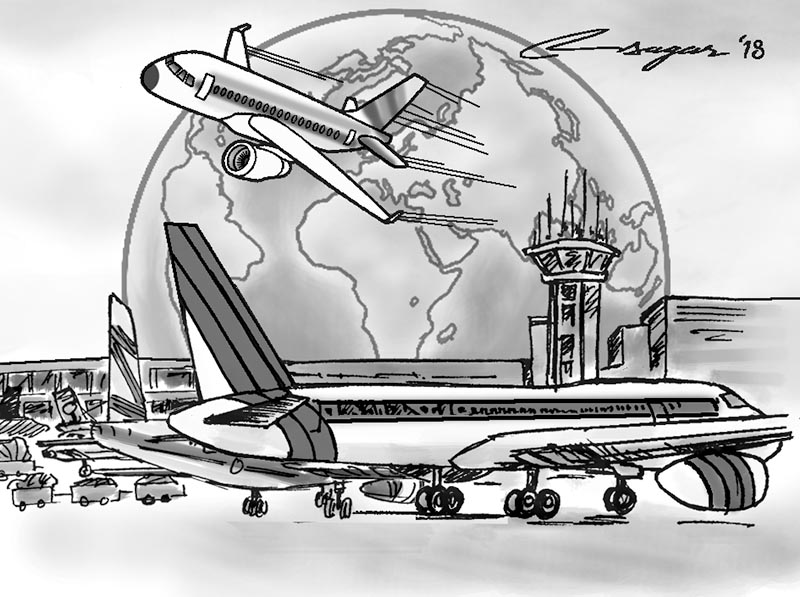Celebrating ICAO Day: Safety and security first
As the stakeholders in the aviation sector observe International Civil Aviation Organisation Day, it is time to pledge solidarity and work in concert to be able to confront the odds and overcome the challenges facing Nepal’s aviation sector
On December 7 every year, those involved in the aviation industry and the stakeholders observe ICAO (International Civil Aviation Organisation) Day. Those involved in the aviation sector are familiar with ICAO. However, I would like to shed some light on the ICAO background, the history of ICAO Day and the importance of celebrating ICAO Day.
ICAO was established on December 7, 1944. Through the Assembly Resolution A29-1 (1994), December 7 was declared International Civil Aviation Day in 1994 as part of ICAO’s 50th-anniversary activities. Two years later, the United Nations General Assembly in 1996 officially recognised December 7 as International Civil Aviation Day.
The purpose of the annual celebration is to establish and reinforce worldwide awareness of the importance of international civil aviation in the social and economic development of States.
The Convention on International Civil Aviation signed on December 7, 1944, by 52 States is also known as Chicago Convention.
The importance of aviation as an engine of global connectivity has never been more relevant to Chicago Convention’s objectives to look to international flight as a fundamental enabler of global peace and prosperity, for the United Nations and world nations have now adopted Agenda 2030 and embarked on a new era in global sustainable development.
Every five years, coinciding with ICAO anniversaries (2014/2019/2024/2029 and so on), the ICAO Council establishes a special anniversary theme for International Civil Aviation Day. In accordance, for 2015-2018 inclusive the Council has selected the theme: “Working Together to Ensure No Country is Left Behind”
ICAO was also created to promote international harmony and friendship through its standard rules and regulations that would ensure better security, safety, efficiency and regularity of air transport.
Presently, air transportation faces many challenges, especially on the safety, security and the latest on the pollution fronts (that has been created by the air transport), creating a global aviation challenges for all the stakeholders of the aviation sector. Yet, ICAO is forging ahead with its strategic planning to confront these upcoming difficulties and seeks all its 191 contracting states’ unflagging response and understanding to mitigate the global airport transport problems.
Today, when all the state members are celebrating ICAO Day with different programmes, Nepal is also observing the day with enthusiasm and fanfare. But what we need more is our renewed pledge to better the civil aviation sector of Nepal by ensuring that the Nepali sky is safe, secured and does not get overcrowded — both on the ground and in the sky. This can only be achieved if all those involved in the aviation sector are self-motivated and all concerned perform their jobs with dedication and integrity.
As we observe this day, we must pledge solidarity and work in concert to be able to confront the odds and overcome the challenges facing Nepal’s aviation sector.
In Nepal’s context, our aviation sector still continues to face lots of turbulences. Accidents and aviation-related incidents are still the bane of Nepal’s aviation industry. Nepal is still to get the clean chit — even after five years — from the European Union due to lack of improvement in safety oversight by the country’s aviation regulator. As a result, the European Commission has continued its ban on all Nepali airlines from flying within the 28-nation bloc of the European Union.
The European Commission only recently said that the European Aviation Agency found no change in the country’s five-year-old status as far as air safety was concerned that all Nepali air carriers were still prohibited from flying into the EU. Nepal is among the 15 nations facing such ban, which means all air carriers certified by the Civil Aviation Authority of Nepal have been banned from operating within the EU.
It is high time the concern authorities performed their jobs effectively and efficiently so that CAAN can have a strong say to give a facelift to the country’s aviation sector. For this, CAAN must ensure that at least the recommendations of the Accident Investigation Committee are well implemented by the airlines so as to ensure aviation safety and security.
Against this backdrop, if we browse through the various themes of ICAO, we note that they are well focused and have tried to hammer home the point that safety, security and efficiency are of paramount importance and can be achieved only through unity, cooperation and collaboration all the stakeholders.
Air transportation has been the backbone of the financial development of all nations irrespective of how economically sound they are. To reap maximum benefit from the air transportation sector, a country must be able to sustain and spread its wings nationally as well as internationally.
So let us all make a pledge for better solidarity and work with greater determination to make air transportation safer, secured and economic.
Singh, a former joint secretary at Ministry of Culture, Tourism and Civil Aviation, has three decades of experience in the civil aviation sector






